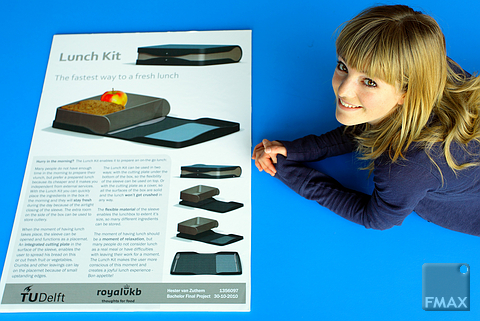Je hebt een carrière en je wilt wat. Een lekkere, gezonde en niet al te dure lunch bijvoorbeeld, na je overgeslagen ontbijt. Stap 1: de Lunch Kit van IO-student Hester van Zuthem.
Lunchtrommeltjes hebben een beetje een knullig imago. Ze horen bij schoolkinderen of stoffige mannen in ribbroek; niet bij een flitsende, vers afgestudeerde carrièretijger. Ze zorgen namelijk niet alleen voor verschrikkelijk kleffe boterhammen, maar zien er doorgaans ook nog eens ontzettend lelijk uit, vindt Hester van Zuthem (22). “Knalrood of –geel, en dan ook nog eens van goedkope kunststof”, gruwt ze. Hoog tijd voor design anno nu.
Royal VKB, het bedrijf voor wie ze haar bachelor-eindopdracht ontwierp, maakt keukengerei in alle soorten en maten. Een beetje afbakenen was dus wel nodig voordat ze aan het ontwerpen sloeg. “Ik wilde iets maken om het onderweg eten te vergemakkelijken. En lunch is meestal de maaltijd die je niet thuis eet.” Ze besloot zich te richten op zakenlui. Of liever: mensen met een druk bestaan die ’s ochtends geen tijd hebben om een verse lunch te bereiden, maar wel goedkoop en lekker willen eten. “Dus bedacht ik de Lunch Kit, met ruimte voor de ingrediënten, bestek én een geïntegreerde placemat om de lunch ter plekke op te bereiden.” En hij ziet er hartstikke hip uit, met zijn aluminium box en rubberen buitenkant. “Hij is veel strakker dan de lunchboxen die nu op de markt zijn”, constateert de IO’er tevreden.
Dat vond Royal VKB ook en het bedrijf besloot Van Zuthems idee over te nemen. “Ze onderzoeken nu of mijn Lunch Kit produceerbaar en winstgevend is.”
Alleen, het is wel handig, zo’n verse lunch uit eigen koelkast, want is de gemiddelde yuppenkoelkast niet chronisch leeg? “Dat heeft tot nu toe nog niemand opgemerkt”, lacht de student. Gelukkig verkoopt bijna elke benzinepomp snacktomaten en kaas, dus het is geen onoverkomelijk probleem, zou je zeggen. Het stond haar eindcijfer, een 9, ook niet in de weg. Bovendien: ze heeft grotere dilemma’s om zich zorgen over te maken. Hoe je een Keniaans weeshuis optimaal gebruik laat maken van energie, bijvoorbeeld. “Ook dat is een project voor de TU. Ik vertrek binnenkort met een paar studenten om de energiehuishouding in drie weeshuizen te onderzoeken.” Tot die tijd is ze even vrij, en hoopt ze op een uitslag van het marktonderzoek van Royal VKB. “Volgend collegejaar begin ik aan mijn master design for interaction. Mooi als ik die meteen met praktijkervaring kan beginnen.”
Name: Olga di Ruggero (29)
Nationality: Italian
Supervisor: Assistant professor Alexander de Haan (TPM)
Subject: Public acceptance of hydrogen as a future energy
carrier
Thesis defense: In two years
“Hydrogen, like other biofuels, is not an energy carrier that exists in nature. Instead, we must produce, store, distribute and use hydrogen, which can be done in all kinds of different ways. To mention a few examples: hydrogen can be produced using fossil fuels, renewable sources or nuclear energy. It can then be stored as a gas, a liquid or in solid form, and it can be distributed with trucks or pipelines or be produced at the same place we use it, such as, for example, in planes, houses or mobile phones. If you think about it, hydrogen is not only a technology; it is also a lot of possible futures. I’ve explored all these possible options and created future scenarios.
When you ask a person what he/she thinks about a particular scenario, that person will always like and dislike a certain part of it, depending on what he/she thinks is important. In other words, their opinion will be based on whether the scenario will help to solve certain problems concerning energy and sustainability. But if you ask five people what these problems with energy are, they will come up with five different answers, varying from global warming to air pollution to a lack of fossil fuels.
All these different views on what the problem is can be reasons for people to change to new technologies, like hydrogen. However, acceptance problems will arise if you want to realize a future that does not address and solve the problems a person thinks are important. On the other hand, people with contrasting views about problems can agree on the same hydrogen future.
I’m interested in who likes what future and why; therefore, I’m looking for parties and coalitions within the public. In particular I’m curious how lay people, people from the street, agree with experts on hydrogen.
More generally, you can think that hydrogen will be accepted because of environmental reasons or rejected because of safety issues, but this picture of reality is far too generic and the public is not a one-headed entity with one opinion. Because we all have different values, beliefs and norms, I am therefore making the discussion about public acceptance more complex and clearer at the same time.
Personally, I don’t know whether or not there will be a hydrogen economy, although this research has certainly changed my opinion on sustainability. We’re now focusing too much on climate change by trying to reduce CO2, but the way we’re doing this is not always sustainable. Sustainability is more than climate change; it’s also about whether our natural resources, like forests, will be available for future generations or not. Sustainability has to do with the way we live.
During my years studying psychology in Italy, I had always wanted to do a PhD. But it would not have been possible to do this in Italy, because the people there are not so open to this kind of research. Besides, my country of birth is much more hierarchical. At the faculty of Technology, Policy and Management, they treat me as a colleague and encourage me to discuss my ideas with others. People here are so amazingly interested!”



Comments are closed.